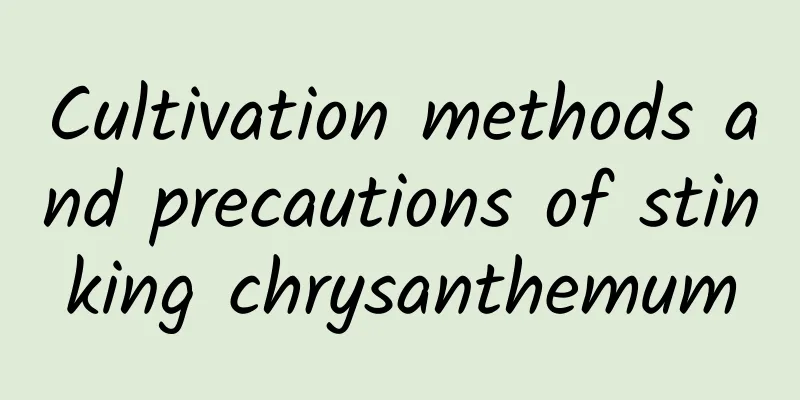Cultivation methods and precautions of stinking chrysanthemum

|
The stinking chrysanthemum is also called stinking hibiscus or marigold. It is a plant of the genus Tagetes in the Asteraceae family. It is native to Mexico and is a beautiful and colorful ornamental flower plant. In recent years, it has also been very common in domestic flower markets. Some people like to buy it and grow it at home. However, the stinking chrysanthemum often dies because of the lack of understanding of its cultivation method. Today I will give a comprehensive introduction to its cultivation method, and let everyone know what to pay attention to when cultivating stinking chrysanthemums. After learning this knowledge, it will become very simple to cultivate stinking chrysanthemums. Farming methods1. Breeding environment The vitality of stinking chrysanthemum is very strong. It is not demanding on the soil. Usually, you can choose loose sandy soil with good air permeability and drainage. This plant likes a warm and humid environment. It can be placed in a sunny place. It grows fastest when the outside temperature is between 20 and 30 degrees, but when the temperature is higher than 30 degrees, it will stop growing, and when the temperature is below ten degrees in winter, it will also enter a dormant period. 2. Fertilizer and water management Fertilizer and water management is very important in the cultivation of stinking chrysanthemum. This plant likes water, but the amount of water should not be too much each time, as long as it is watered thoroughly. In addition, the demand for water of stinking chrysanthemum varies in different seasons. In summer, the temperature is high and the evaporation is fast, so more watering is needed. In winter, the water evaporates slowly, so the number of watering should be reduced. In addition, stinking chrysanthemum is a fertilizer-loving plant. During its growth period, it should be fertilized once a month. The fertilizer can be a compound fertilizer rich in nitrogen, phosphorus and potassium. Breeding precautions1. Pay attention to pruning When cultivating stinking chrysanthemums, you must pay attention to timely pruning. After transplanting, you can pinch the tops several times to promote the growth of flower branches. In addition, after the stinking chrysanthemums bloom, you must promptly cut off the remaining flowers and overcrowded branches and leaves, so as to promote the growth of new branches and increase the number of flowers. 2. Pest and disease control When growing stinking chrysanthemum, you should also pay attention to pest control. Leaf spot, leaf blight and powdery mildew are its most common diseases. Remove diseased branches and leaves in time, and spray medicine in time. In addition, during the growth period of this plant, it is also prone to pests such as aphids and armyworms. After the occurrence of pests, spraying malathion solution in time can eliminate the pests. |
<<: Cultivation methods and precautions of stinking begonia
>>: Cultivation methods and precautions for double petunia
Recommend
How to grow gardenia? Gardenia cultivation methods and techniques
When gardenias bloom, people look forward to it t...
The benefits of eating kiwi fruit
Do you know what super fruit is? Let me tell you,...
The efficacy and function of Gracilaria
Gracilaria is an algae plant that grows on the so...
The efficacy and function of cauliflower
Chinese cabbage is one of the unique dishes in Ch...
What is Reebok like? Reebok reviews and website information
What is Reebok? Reebok is a famous British sports ...
What are the symptoms of crab allergy? What should I do if I am allergic to crab?
Crab is a delicious seafood ingredient with high ...
How is Cup Noodles? Cup Noodles reviews and website information
What is Cup Noodle? Cup Noodle (カップヌードル, CUP NOODL...
How to make monk fruit tea How to make monk fruit tea
Modern people pay attention to health preservatio...
Pork ribs stewed with radish
I heard that stewed radish in Pai Shan Jiao taste...
What to do with pharyngitis? Common dietary treatments for pharyngitis
Pharyngitis is a common disease in humans every s...
How to make delicious braised pork with winter vegetables
Braised pork with preserved vegetables is usually...
The efficacy and function of white corn porridge
Nowadays, it is popular to eat health-preserving ...
How to make orange fruit tea How to make orange fruit tea
Orange is a delicious fruit that people often eat...
How to eat fresh yellow peel? Tips on eating fresh yellow peel
Kumquat is a sweet and sour fruit that tastes ver...
The pros and cons of eating organic food
Many people know that eating organic food is good...









